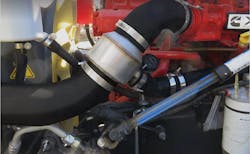GISS completes SPIER testing to meet 2027 EPA standards
As the Environmental Protection Agency’s (EPA) new rules for model year (MY) 2027 vehicles have taken effect in 2023, many fleets have been forced to plan ahead for the stricter regulations. To do so, Grand Island Sales & Service (GISS), a petroleum products hauler, recently completed testing of the SPI Exhaust Reaction (SPIER) System. Based on data collected digitally throughout the tests, GISS has reported that the new system is effective and have now entered into an agreement to install SPIER on all of its trucks.
“With all the changes in government regulations and costs of operation, SPIER answers many of those challenges,” said John Simon, president of Grand Island Sales and Service. “I recommend it to all fleet owners who operate diesel-powered equipment with emission controls of vintages 2010 or later. As SPI says, it’s ‘Already Green’ technology.”
SPIER is a combination of exhaust plumbing and “dual induction” of a portion of the tailpipe exhaust back into the engine cylinders. The chemical engineering of this approach releases enormous alternative energy in the combustion process, which decreases fuel consumption and harmful emissions. There is no interaction with, or alteration of, OEM systems on the vehicle. Added benefits are lower soot levels inside the engine, which cuts maintenance costs and reduces the need for exhaust aftertreatment solutions, and a gain in power, especially when climbing steep terrains.
“Many trucking companies are overburdened with increased costs of operation and essentially no near-term options to meet emissions laws and make a reasonable profit,” said Jack Schickler, the chemical engineer who invented SPIER and president of SPI.Systems. “In the end, the customers of fleets, such as grocery chains, are also paying those costs. SPIER cuts through this dilemma with an immediate, affordable system for ‘upfitting’ any diesel truck. There’s no more need to helplessly wait for a solution.”
GISS tested SPIER on a tanker in December, pulling 117,000 lbs of fuel from Rochester to Buffalo. They reported a 21.5% increase in fuel efficiency and a 48.1% reduction in output of “NOx” gases, which are the most harmful greenhouse gases that contribute to air pollution. GISS also reported a 5% improvement in horsepower in trucks that pull nearly 60 tons of fuel.
The reduction in NOx reported by GISS is enough to meet EPA emissions standards for 2027. According to the EPA, trucks beginning with model year 2027 will need to reduce NOx output by up to 40% compared to the current standard.
SPIER can be installed on any diesel truck dating back to 2010 in approximately 6-8 hours with a kit of parts supplied by SPI.Systems. Early adopters are achieving full return on investment in less than one year from installation date, the company has said.


